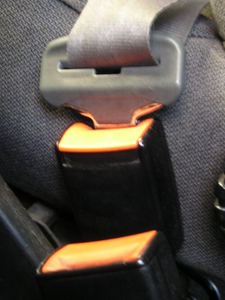Add to the list of reasons one should always wear a seat belt: The seat belt defense.

Although some states have specifically barred defendants in car accident lawsuits from using this defense, Florida is not among them.
The seat belt defense essentially holds that a person who is severely injured or killed in a car accident may be found partially to blame if not wearing a seat belt, as required by law. A person may still recover damages in Florida in cases of comparative fault, but compensation will be reduced by whatever percentage of blame he or she is deemed by a judge or jury to hold. With the seat belt defense, defendant will assert liability only for injuries that might have been sustained had plaintiff or decedent been wearing a seat belt – which is to say, they will assert injuries would have been far less severe, and thus they should not have to pay nearly as much.
When injuries result from another person’s negligence, the victim should not have to foot the bill, regardless of whether he or she buckled up that day. Those who have sustained auto injuries in Fort Lauderdale can overcome the seat belt defense or at least minimize the impact, but it requires experienced legal representation.
In the recent case of Jones v. Alayon, we see how damaging the seat belt defense can be.
Court records indicate plaintiff, daughter of decedent and representative of his estate, sued another driver who had rear-ended decedent, causing him to strike a guardrail, overturn, be ejected from the vehicle and be run over by several passing motorists. Cause of death was either striking the pavement after ejection or being struck by the other vehicles. Defendant was an off-duty police officer who fled the scene and then later reported his vehicle stolen. Although he would admit at trial he caused the crash, he denied his actions caused decedent’s death, citing decedent’s failure to use a seat belt as a form of comparative negligence – i.e., the seat belt defense.
Trial court declined to allow into evidence the fact defendant was a police officer or that he’d fled the scene, indicating the probative value did not outweigh the potential prejudice.
With regard to the seat belt issue, plaintiff asserted her father always wore a seat belt. However, two weeks earlier, he’d discovered a coin had jammed the seat belt function. He had tried to fix it, but was unsuccessful and had told his daughter he was going to need to take the vehicle in for repair. However, he had not yet done so at the time of the crash.
Plaintiff attempted to secure a directed verdict on the seat belt defense, asserting it was legally insufficient because there was no evidence the seat belt was operational at the time of the crash. However, the court denied this motion, finding it was up to the jury to decide whether plaintiff was negligent for the fact that he had not yet repaired the seat belt.
Ultimately, jurors found defendant 30 percent at fault, while decedent was 70 percent at fault for his own death – not because he’d caused the crash, but because he had not worn a seat belt. Jurors rendered $340,000 in damages, but only awarded 30 percent of that, or $102,000.
On appeal, the 4th DCA affirmed, finding trial court did not err in its decisions about which testimony and evidence to admit and which to eliminate (the basis of plaintiff”s appeal).
The seat belt defense can indeed be damaging. While wearing a seat belt is advisable, in cases where plaintiff or decedent had not been wearing one, it’s imperative to seek an accomplished legal team to help address these challenges.
Call Fort Lauderdale Injury Attorney Richard Ansara at (954) 761-4011. Serving Broward, Miami-Dade and Palm Beach counties.
Additional Resources:
Jones v. Alayon, April 8, 2015, Florida’s Fourth District Court of Appeal
More Blog Entries:
Crusoe v. Davis – Police Report as Hearsay in Car Accident Lawsuit, March 14, 2015, Fort Lauderdale Car Accident Attorney Blog
 Broward Injury Lawyer Blog
Broward Injury Lawyer Blog



